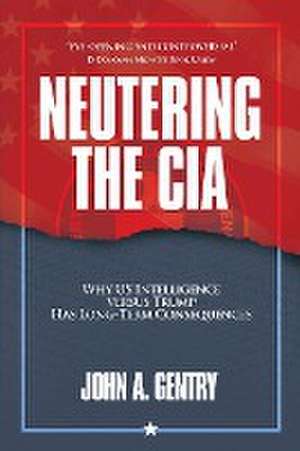Neutering the CIA
Autor John A Gentryen Limba Engleză Paperback – 26 iul 2023
| Toate formatele și edițiile | Preț | Express |
|---|---|---|
| Paperback (1) | 175.79 lei 3-5 săpt. | |
| Armin Lear Press – 26 iul 2023 | 175.79 lei 3-5 săpt. | |
| Hardback (1) | 295.51 lei 3-5 săpt. | |
| Owl's Nest Publishers, LLC – 26 iul 2023 | 295.51 lei 3-5 săpt. |
Preț: 175.79 lei
Nou
Puncte Express: 264
Preț estimativ în valută:
33.64€ • 34.89$ • 28.05£
33.64€ • 34.89$ • 28.05£
Carte disponibilă
Livrare economică 06-20 martie
Preluare comenzi: 021 569.72.76
Specificații
ISBN-13: 9781956450699
ISBN-10: 1956450696
Pagini: 528
Dimensiuni: 152 x 229 x 29 mm
Greutate: 0.76 kg
Editura: Armin Lear Press
ISBN-10: 1956450696
Pagini: 528
Dimensiuni: 152 x 229 x 29 mm
Greutate: 0.76 kg
Editura: Armin Lear Press
Notă biografică
John A. Gentry was for twelve years an intelligence analyst at the Central Intelligence Agency, where he worked mainly on economic issues concerning the Soviet Union and Eastern Europe. He also was senior analyst on the staff of the National Intelligence Officer for Warning in 1987-1989. In 1986 he experienced politicization from the political Right-efforts by CIA managers to make the Soviet Union and its allies look even worse than they clearly were. He approached the Senate intelligence committee about his concerns in 1991 during the confirmation hearings of Robert Gates to be director of central intelligence, recommending that Gates not be confirmed. Gates was head of CIA's analysis directorate in 1982-1986 and was, many CIA personnel then believed, responsible for the politicization. History indicates fairly clearly that politicization of all sorts is damaging in many ways, and Gentry has tracked the issue of politicization of intelligence by intelligence professionals closely ever since. The politicization since 2016 has been from the political Left, does the same kind of damage Gentry personally experienced, but is massive by historical standards and correspondingly is a much more important development in US intelligence and national political history.After completing his Ph.D. in 2008, Gentry taught at several educational institutions, including the National Defense University, George Mason University, Columbia University, and from 2011 to 2015 at National Intelligence University-the educational arm of the intelligence community. Hence, he fairly recently was a member of the IC, dealing daily with personnel from virtually all IC agencies. He is now an adjunct professor with Georgetown University's School of Foreign Service. He teaches courses on intelligence subjects.Especially after turning to teaching, Gentry has also written extensively on security-related subjects, especially in recent years on intelligence topics. He has published more than 30 articles on intelligence subjects, mainly in academic journals such as Intelligence and National Security and International Journal of Intelligence and CounterIntelligence. He is on the editorial advisory board of International Journal of Intelligence and CounterIntelligence. He has written three published books, two of which are on intelligence topics. His most recent book (with Joseph S. Gordon) is Strategic Warning Intelligence: History, Challenges, and Prospects (Georgetown University Press, 2019). He is a member of the International Studies Association, which has a vibrant intelligence studies section, and is well-known to intelligence studies scholars.
